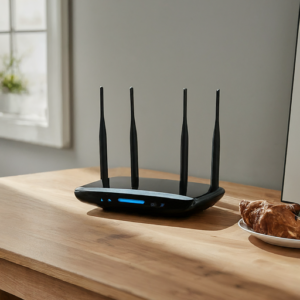 In the ever-evolving landscape of home and office networking, choosing the right Wi-Fi solution can be a daunting task. With the rise of mesh networks, the traditional router no longer stands as the sole option for providing wireless connectivity. But how do you decide which is the right fit for your needs? In this article, we’ll dive into the differences between mesh networks and traditional routers, helping you make an informed decision.
In the ever-evolving landscape of home and office networking, choosing the right Wi-Fi solution can be a daunting task. With the rise of mesh networks, the traditional router no longer stands as the sole option for providing wireless connectivity. But how do you decide which is the right fit for your needs? In this article, we’ll dive into the differences between mesh networks and traditional routers, helping you make an informed decision.
What Are Traditional Routers?
Traditional routers have been the cornerstone of home and office networks for years. These devices connect directly to your modem and broadcast a Wi-Fi signal throughout the area. Typically, they consist of a single unit that provides wireless coverage. However, the range and strength of the signal can vary significantly based on the router’s quality and the layout of your space.
What Are Mesh Networks?
Mesh networks are the new kids on the block. Instead of relying on a single router, mesh networks use multiple nodes placed around your home or office to create a seamless web of connectivity. These nodes communicate with each other, ensuring consistent coverage even in larger or more complex spaces. The result is a more reliable and robust Wi-Fi experience.
Coverage and Range
Traditional Routers
Traditional routers can struggle with coverage, especially in large homes or offices with multiple floors and thick walls. Dead zones, where the Wi-Fi signal is weak or nonexistent, are common.
Mesh Networks
Mesh networks excel in providing extensive coverage. By strategically placing nodes around your space, you can eliminate dead zones and ensure a strong signal in every corner of your home or office.
Ease of Setup
Traditional Routers
Setting up a traditional router is relatively straightforward. You connect it to your modem, configure the settings via a web interface or app, and you’re good to go. However, optimizing placement to avoid dead zones can require some trial and error.
Mesh Networks
Mesh networks are designed with user-friendliness in mind. Most systems come with intuitive apps that guide you through the setup process. Placing the nodes is simple, and the system often automatically configures the network for optimal performance.
Scalability
Traditional Routers
Expanding a traditional router’s coverage typically involves adding range extenders. However, these extenders can create separate networks (SSIDs), leading to potential connectivity issues as devices switch between them.
Mesh Networks
Mesh networks are inherently scalable. Adding more nodes to your system is seamless, with the new nodes integrating into the existing network without creating multiple SSIDs. This ensures a smooth, uninterrupted Wi-Fi experience.
Performance
Traditional Routers
Performance can vary widely with traditional routers. High-end models can deliver excellent speeds and handle multiple devices well. However, performance often degrades with distance from the router.
Mesh Networks
Mesh networks generally provide consistent performance throughout the coverage area. Since nodes communicate and share the load, they can maintain higher speeds and better handle multiple devices simultaneously.
Cost
Traditional Routers
Traditional routers are usually less expensive than mesh systems. However, costs can add up if you need additional equipment like range extenders to cover a larger area.
Mesh Networks
Mesh networks tend to be more expensive upfront. However, the investment can be justified by the superior coverage, ease of use, and scalability they offer.
Which Is Right for You?
Choosing between a traditional router and a mesh network depends on your specific needs:
– Small to Medium-Sized Homes or Offices If you have a smaller space with minimal dead zones, a high-quality traditional router may suffice. They are cost-effective and straightforward to set up.
– Large Homes, Multi-Story Buildings, or Complex Layouts If you struggle with coverage and have multiple devices connected simultaneously, a mesh network is likely the better option. The consistent coverage and performance, along with ease of expansion, make mesh systems ideal for larger or more demanding environments.
– Future-Proofing If you anticipate needing to expand your network or want the latest in networking technology, investing in a mesh network can be a wise choice.
In conclusion, both traditional routers and mesh networks have their advantages and ideal use cases. Assess your space, coverage needs, and budget to determine which solution best fits your requirements. With the right choice, you’ll enjoy fast, reliable Wi-Fi throughout your home or office.
For more information on traditional router setup, home network setup, wi-fi setup or mesh network setup in Louisville, KY visit us at the website or call (502)963-3981 On-Site Louisville Computer Repair Co. today!


